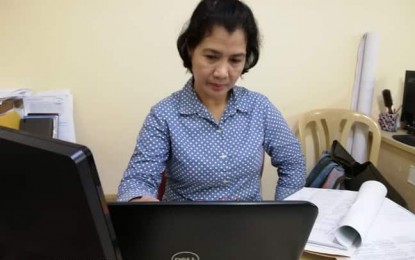
ENDO. The Department of Labor and Employment (DOLE) in Western Visayas assisted in the regularization of close to 25,000 private workers from 2018 until June this year. DOLE targeted the regularization of 15,000 workers in 2018 and 2019. (PNA photo by Perla G. Lena)
ILOILO CITY -- Close to 25,000 workers employed in the private sector in Western Visayas were given security of tenure as employers heeded the call of President Rodrigo Roa Duterte to put an end to contractualization.
Amy Judicpa, senior labor, and employment officer of the Department of Labor and Employment (DOLE) in Western Visayas, said on Thursday that in 2018, the region was able to achieve 113 percent of its target. During the first semester of this year, they already achieved 52 percent of their target number of private workers to be regularized.
DOLE targeted the regularization of 15,000 workers in 2018 and 2019.
The 113 percent is equivalent to 16,878 regularized workers in 2018 and 7,800 from January to June this year, she said in an interview.
“We are doing something to overshoot the target. Precisely we are on track because as of first semester, we already achieved more than 50 percent,” she added.
For 2019, Negros Occidental posted the highest number of regularized workers with 2,890 followed by Iloilo with 2,778; Aklan has 516; Antique, 563; Capiz, 1076, and Guimaras, 59.
Judicpa said that they rely on the effectiveness of their advocacy as a strategy to encourage employers to regularize their workers.
“Since the start of the pronouncement of President, who emphasized that he wanted to end contractualization, we intensified our advocacy campaign. That is why we are now harvesting the fruits of the hard work that we have invested,” she said. The employers appreciated the value of their efforts, she added.
Nonetheless, she admitted that there are companies, which are difficult to deal with and do not submit their regularized list.
However, during the inspection, the labor agents also determine who among their workers are to be regularized and who are not. “Based on the law, the position has to be desirable and necessary to the function of the company (to be regularized),” she explained.
A regular worker is entitled to a minimum or above minimum basic wage, premium if they render overtime duty, incentive leave and other entitlements.
The labor inspectors also look into the compliance of the establishment to the General Labor Standards, which cover their salaries, all monetary benefits, and occupational safety.
If concerns will not show up during the inspection, there is also a mechanism called Single Entry Approach (SEnA) where workers can vent their problems and recover their unpaid monetary benefits.
Non-compliant companies are given 10 days to correct their violations at the plant level. However, after a certain period that they still fail to follow, then they will be issued a compliance order.
Judicpa noted the cooperation of workers is very important when there is an inspection. She said that inspectors rely on interviews and documents during the inspection.
“There are workers who do not tell the truth for fear of reprisal. The challenge is how to get correct information because we cannot insist unless they speak out,” she said.
Meantime, apart from regularizing private workers, DOLE 6 also extended livelihood assistance under the DOLE Integrated Livelihood and Emergency Program (DILEEP) to 6,082 beneficiaries in 2018 and 2,455 during the first six months of this year.
The Tulong Pangkabuhayan sa Ating Disadvantaged/Displaced (TUPAD) workers benefitted 41,840 beneficiaries, to already include displaced workers as a result of the Boracay closure, in 2018 and 20, 423 from January to June this 2019.
The Special Program for Employment of Students (SPES) have aided 11,062 student beneficiaries, a 125 percent accomplishment when compared with the target of 8, 827 beneficiaries for 2018 and 5, 191 from January to June out of the 5,089 target recipients for this year.
The Government Internship Program (GIP), meantime, benefitted 1,469 intern-beneficiaries last year and 28 intern-beneficiaries from January to June 2019. (PNA)
